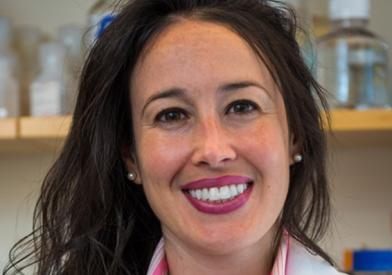-
Mammalian SWI/SNF chromatin remodeling complexes promote tyrosine kinase inhibitor resistance in EGFR-mutant lung cancer. Cancer Cell. 2023 08 14; 41(8):1516-1534.e9. View in:
Pubmed
-
Landscape of mSWI/SNF chromatin remodeling complex perturbations in neurodevelopmental disorders. Nat Genet. 2023 08; 55(8):1400-1412. View in:
Pubmed
-
The SWI/SNF chromatin-remodeling subunit DPF2 facilitates NRF2-dependent antiinflammatory and antioxidant gene expression. J Clin Invest. 2023 07 03; 133(13). View in:
Pubmed
-
DYRK1A promotes viral entry of highly pathogenic human coronaviruses in a kinase-independent manner. PLoS Biol. 2023 06; 21(6):e3002097. View in:
Pubmed
-
Structural and functional properties of mSWI/SNF chromatin remodeling complexes revealed through single-cell perturbation screens. Mol Cell. 2023 04 20; 83(8):1350-1367.e7. View in:
Pubmed
-
Stepwise activities of mSWI/SNF family chromatin remodeling complexes direct T cell activation and exhaustion. Mol Cell. 2023 04 20; 83(8):1216-1236.e12. View in:
Pubmed
-
Pharmacological disruption of mSWI/SNF complex activity restricts SARS-CoV-2 infection. Nat Genet. 2023 03; 55(3):471-483. View in:
Pubmed
-
A pioneer factor locally opens compacted chromatin to enable targeted ATP-dependent nucleosome remodeling. Nat Struct Mol Biol. 2023 01; 30(1):31-37. View in:
Pubmed
-
Arid1a loss potentiates pancreatic ß-cell regeneration through activation of EGF signaling. Cell Rep. 2022 11 01; 41(5):111581. View in:
Pubmed
-
SMARCE1 deficiency generates a targetable mSWI/SNF dependency in clear cell meningioma. Nat Genet. 2022 06; 54(6):861-873. View in:
Pubmed
-
The FUS::DDIT3 fusion oncoprotein inhibits BAF complex targeting and activity in myxoid liposarcoma. Mol Cell. 2022 05 05; 82(9):1737-1750.e8. View in:
Pubmed
-
Synthesis of Oriented Hexasomes and Asymmetric Nucleosomes Using a Template Editing Process. J Am Chem Soc. 2022 02 09; 144(5):2284-2291. View in:
Pubmed
-
OCT4 cooperates with distinct ATP-dependent chromatin remodelers in naïve and primed pluripotent states in human. Nat Commun. 2021 08 26; 12(1):5123. View in:
Pubmed
-
A functional mammalian display screen identifies rare antibodies that stimulate NK cell-mediated cytotoxicity. Proc Natl Acad Sci U S A. 2021 08 03; 118(31). View in:
Pubmed
-
Chromatin landscape signals differentially dictate the activities of mSWI/SNF family complexes. Science. 2021 07 16; 373(6552):306-315. View in:
Pubmed
-
Opposing immune and genetic mechanisms shape oncogenic programs in synovial sarcoma. Nat Med. 2021 02; 27(2):289-300. View in:
Pubmed
-
Author Correction: The nucleosome acidic patch and H2A ubiquitination underlie mSWI/SNF recruitment in synovial sarcoma. Nat Struct Mol Biol. 2021 Jan; 28(1):118. View in:
Pubmed
-
BICRA, a SWI/SNF Complex Member, Is Associated with BAF-Disorder Related Phenotypes in Humans and Model Organisms. Am J Hum Genet. 2020 12 03; 107(6):1096-1112. View in:
Pubmed
-
Genome-wide CRISPR Screens Reveal Host Factors Critical for SARS-CoV-2 Infection. Cell. 2021 01 07; 184(1):76-91.e13. View in:
Pubmed
-
A Structural Model of the Endogenous Human BAF Complex Informs Disease Mechanisms. Cell. 2020 10 29; 183(3):802-817.e24. View in:
Pubmed
-
Mammalian SWI/SNF Chromatin Remodeling Complexes: Emerging Mechanisms and Therapeutic Strategies. Trends Genet. 2020 12; 36(12):936-950. View in:
Pubmed
-
The nucleosome acidic patch and H2A ubiquitination underlie mSWI/SNF recruitment in synovial sarcoma. Nat Struct Mol Biol. 2020 09; 27(9):836-845. View in:
Pubmed
-
ARID1A loss in neuroblastoma promotes the adrenergic-to-mesenchymal transition by regulating enhancer-mediated gene expression. Sci Adv. 2020 07; 6(29):eaaz3440. View in:
Pubmed
-
A Novel SS18-SSX Fusion-specific Antibody for the Diagnosis of Synovial Sarcoma. Am J Surg Pathol. 2020 07; 44(7):922-933. View in:
Pubmed
-
Synthetic Lethal and Resistance Interactions with BET Bromodomain Inhibitors in Triple-Negative Breast Cancer. Mol Cell. 2020 06 18; 78(6):1096-1113.e8. View in:
Pubmed
-
Mammalian SWI/SNF Complex Genomic Alterations and Immune Checkpoint Blockade in Solid Tumors. Cancer Immunol Res. 2020 08; 8(8):1075-1084. View in:
Pubmed
-
Genomic and Immunologic Characterization of INI1-Deficient Pediatric Cancers. Clin Cancer Res. 2020 06 15; 26(12):2882-2890. View in:
Pubmed
-
ARID1A determines luminal identity and therapeutic response in estrogen-receptor-positive breast cancer. Nat Genet. 2020 02; 52(2):198-207. View in:
Pubmed
-
Recurrent SMARCB1 Mutations Reveal a Nucleosome Acidic Patch Interaction Site That Potentiates mSWI/SNF Complex Chromatin Remodeling. Cell. 2019 11 27; 179(6):1342-1356.e23. View in:
Pubmed
-
Spliceosomal disruption of the non-canonical BAF complex in cancer. Nature. 2019 10; 574(7778):432-436. View in:
Pubmed
-
Diverse compositions and functions of chromatin remodeling machines in cancer. Sci Transl Med. 2019 07 17; 11(501). View in:
Pubmed
-
Renal medullary carcinomas depend upon SMARCB1 loss and are sensitive to proteasome inhibition. Elife. 2019 03 12; 8. View in:
Pubmed
-
The ATPase module of mammalian SWI/SNF family complexes mediates subcomplex identity and catalytic activity-independent genomic targeting. Nat Genet. 2019 04; 51(4):618-626. View in:
Pubmed
-
Chromatin regulatory mechanisms and therapeutic opportunities in cancer. Nat Cell Biol. 2019 02; 21(2):152-161. View in:
Pubmed
-
Wiskott-Aldrich syndrome protein (WASP) is a tumor suppressor in T cell lymphoma. Nat Med. 2019 01; 25(1):130-140. View in:
Pubmed
-
A non-canonical SWI/SNF complex is a synthetic lethal target in cancers driven by BAF complex perturbation. Nat Cell Biol. 2018 12; 20(12):1410-1420. View in:
Pubmed
-
Targeting CDK9 Reactivates Epigenetically Silenced Genes in Cancer. Cell. 2018 11 15; 175(5):1244-1258.e26. View in:
Pubmed
-
Modular Organization and Assembly of SWI/SNF Family Chromatin Remodeling Complexes. Cell. 2018 11 15; 175(5):1272-1288.e20. View in:
Pubmed
-
Binding of TMPRSS2-ERG to BAF Chromatin Remodeling Complexes Mediates Prostate Oncogenesis. Mol Cell. 2018 08 16; 71(4):554-566.e7. View in:
Pubmed
-
The SS18-SSX Fusion Oncoprotein Hijacks BAF Complex Targeting and Function to Drive Synovial Sarcoma. Cancer Cell. 2018 06 11; 33(6):1128-1141.e7. View in:
Pubmed
-
Interrogation of Mammalian Protein Complex Structure, Function, and Membership Using Genome-Scale Fitness Screens. Cell Syst. 2018 05 23; 6(5):555-568.e7. View in:
Pubmed
-
Disruption of mammalian SWI/SNF and polycomb complexes in human sarcomas: mechanisms and therapeutic opportunities. J Pathol. 2018 04; 244(5):638-649. View in:
Pubmed
-
A Two-Faced mSWI/SNF Subunit: Dual Roles for ARID1A in Tumor Suppression and Oncogenicity in the Liver. Cancer Cell. 2017 11 13; 32(5):542-543. View in:
Pubmed
-
SMARCB1 is required for widespread BAF complex-mediated activation of enhancers and bivalent promoters. Nat Genet. 2017 Nov; 49(11):1613-1623. View in:
Pubmed
-
Cancer-Specific Retargeting of BAF Complexes by a Prion-like Domain. Cell. 2017 Sep 21; 171(1):163-178.e19. View in:
Pubmed
-
A SMARCD2-containing mSWI/SNF complex is required for granulopoiesis. Nat Genet. 2017 Apr 26; 49(5):655-657. View in:
Pubmed
-
Composition and Function of Mammalian SWI/SNF Chromatin Remodeling Complexes in Human Disease. Cold Spring Harb Symp Quant Biol. 2016; 81:53-60. View in:
Pubmed
-
Mammalian SWI/SNF complexes in cancer: emerging therapeutic opportunities. Curr Opin Genet Dev. 2017 Feb; 42:56-67. View in:
Pubmed
-
TOP2 synergizes with BAF chromatin remodeling for both resolution and formation of facultative heterochromatin. Nat Struct Mol Biol. 2017 04; 24(4):344-352. View in:
Pubmed
-
Dynamics of BAF-Polycomb complex opposition on heterochromatin in normal and oncogenic states. Nat Genet. 2017 Feb; 49(2):213-222. View in:
Pubmed
-
Smarca4 ATPase mutations disrupt direct eviction of PRC1 from chromatin. Nat Genet. 2017 Feb; 49(2):282-288. View in:
Pubmed
-
Polycomb and trithorax opposition in development and disease. Wiley Interdiscip Rev Dev Biol. 2016 11; 5(6):659-688. View in:
Pubmed
-
Current state of pediatric sarcoma biology and opportunities for future discovery: A report from the sarcoma translational research workshop. Cancer Genet. 2016 05; 209(5):182-94. View in:
Pubmed
-
Lifting Up the HAT: Synthetic Lethal Screening Reveals a Novel Vulnerability at the CBP-p300 Axis. Cancer Discov. 2016 Apr; 6(4):350-2. View in:
Pubmed
-
PRC2 and SWI/SNF Chromatin Remodeling Complexes in Health and Disease. Biochemistry. 2016 Mar 22; 55(11):1600-14. View in:
Pubmed
-
Mammalian SWI/SNF chromatin remodeling complexes and cancer: Mechanistic insights gained from human genomics. Sci Adv. 2015 Jun; 1(5):e1500447. View in:
Pubmed
-
Complement activation and intraventricular rituximab distribution in recurrent central nervous system lymphoma. Clin Cancer Res. 2014 Feb 15; 20(4):1029-41. View in:
Pubmed
-
Proteomic and bioinformatic analysis of mammalian SWI/SNF complexes identifies extensive roles in human malignancy. Nat Genet. 2013 Jun; 45(6):592-601. View in:
Pubmed
-
CXCL13 plus interleukin 10 is highly specific for the diagnosis of CNS lymphoma. Blood. 2013 Jun 06; 121(23):4740-8. View in:
Pubmed
-
Reversible disruption of mSWI/SNF (BAF) complexes by the SS18-SSX oncogenic fusion in synovial sarcoma. Cell. 2013 Mar 28; 153(1):71-85. View in:
Pubmed
-
Multicenter phase 1 trial of intraventricular immunochemotherapy in recurrent CNS lymphoma. Blood. 2013 Jan 31; 121(5):745-51. View in:
Pubmed
-
Biology and treatment of primary central nervous system lymphoma. Neurotherapeutics. 2009 Jul; 6(3):587-97. View in:
Pubmed
-
Alcohol as a potential contributing factor in radiation complications. Clin Adv Hematol Oncol. 2009 Apr; 7(4):257-62. View in:
Pubmed
-
Pathologic correlates of primary central nervous system lymphoma defined in an orthotopic xenograft model. Clin Cancer Res. 2009 Mar 15; 15(6):1989-97. View in:
Pubmed
-
Differential gene expression in central nervous system lymphoma. Blood. 2009 Jan 01; 113(1):266-7; author reply 267-8. View in:
Pubmed
-
Protein biomarker identification in the CSF of patients with CNS lymphoma. J Clin Oncol. 2008 Jan 01; 26(1):96-105. View in:
Pubmed
-
Molecular pathogenesis of primary central nervous system lymphoma. Neurosurg Focus. 2006 Nov 15; 21(5):E1. View in:
Pubmed
-
When prostate brachytherapy fails: a case report and discussion. Oncologist. 2005 Nov-Dec; 10(10):799-805. View in:
Pubmed






82ec.jpg)

7067.jpg)


